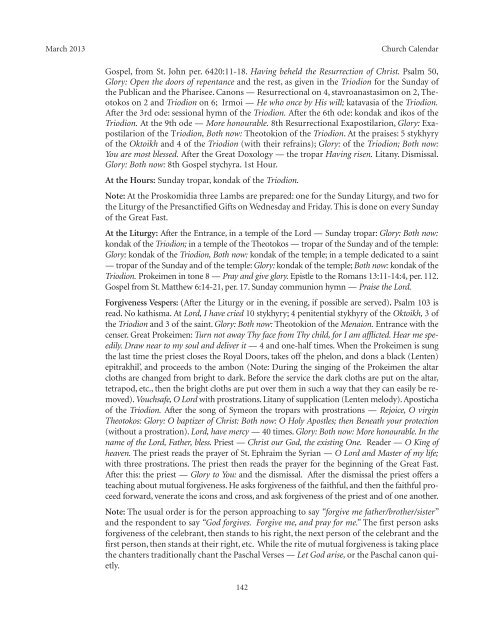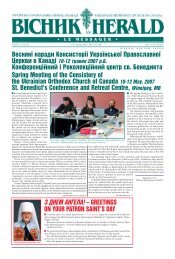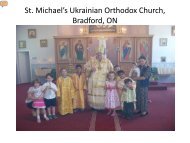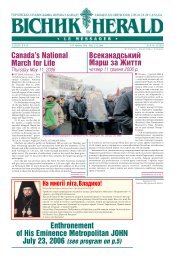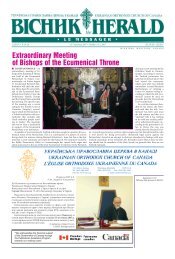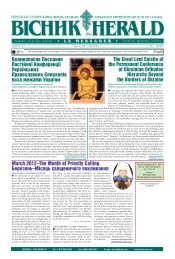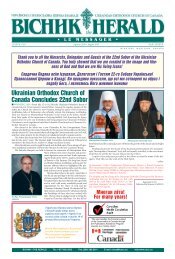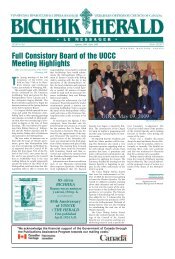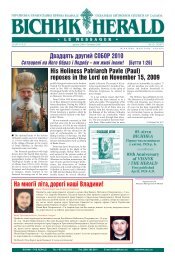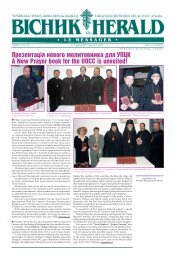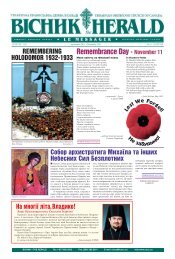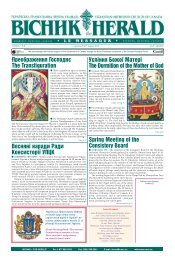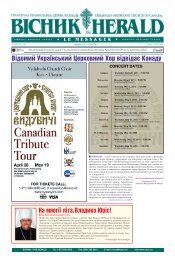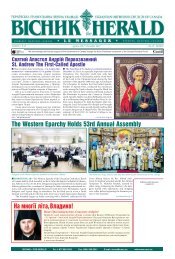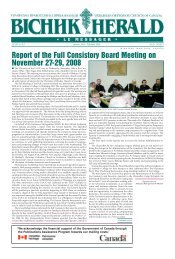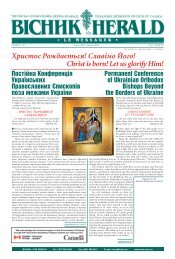January 2013 - Ukrainian Orthodox Church of Canada
January 2013 - Ukrainian Orthodox Church of Canada
January 2013 - Ukrainian Orthodox Church of Canada
You also want an ePaper? Increase the reach of your titles
YUMPU automatically turns print PDFs into web optimized ePapers that Google loves.
March <strong>2013</strong><br />
<strong>Church</strong> Calendar<br />
Gospel, from St. John per. 6420:11-18. Having beheld the Resurrection <strong>of</strong> Christ. Psalm 50,<br />
Glory: Open the doors <strong>of</strong> repentance and the rest, as given in the Triodion for the Sunday <strong>of</strong><br />
the Publican and the Pharisee. Canons — Resurrectional on 4, stavroanastasimon on 2, The -<br />
o tokos on 2 and Triodion on 6; Irmoi — He who once by His will; katavasia <strong>of</strong> the Tri odion.<br />
After the 3rd ode: sessional hymn <strong>of</strong> the Triodion. After the 6th ode: kondak and ikos <strong>of</strong> the<br />
Triodion. At the 9th ode — More honourable. 8th Resurrectional Exapostilarion, Glory: Exa -<br />
pos tilarion <strong>of</strong> the Triodion, Both now: Theotokion <strong>of</strong> the Triodion. At the praises: 5 sty khyry<br />
<strong>of</strong> the Oktoikh and 4 <strong>of</strong> the Triodion (with their refrains); Glory: <strong>of</strong> the Triodion; Both now:<br />
You are most blessed. After the Great Doxology — the tropar Having risen. Litany. Dis mis sal.<br />
Glo ry: Both now: 8th Gospel stychyra. 1st Hour.<br />
At the Hours: Sunday tropar, kondak <strong>of</strong> the Triodion.<br />
Note: At the Proskomidia three Lambs are prepared: one for the Sunday Liturgy, and two for<br />
the Liturgy <strong>of</strong> the Presanctified Gifts on Wednesday and Friday. This is done on every Sunday<br />
<strong>of</strong> the Great Fast.<br />
At the Liturgy: After the Entrance, in a temple <strong>of</strong> the Lord — Sunday tropar: Glory: Both now:<br />
kon dak <strong>of</strong> the Triodion; in a temple <strong>of</strong> the Theotokos — tropar <strong>of</strong> the Sunday and <strong>of</strong> the temple:<br />
Glory: kondak <strong>of</strong> the Triodion, Both now: kondak <strong>of</strong> the temple; in a temple dedicated to a saint<br />
— tropar <strong>of</strong> the Sunday and <strong>of</strong> the temple: Glory: kondak <strong>of</strong> the temple; Both now: kondak <strong>of</strong> the<br />
Triodion. Prokeimen in tone 8 — Pray and give glory. Epistle to the Ro mans 13:11-14:4, per. 112.<br />
Go spel from St. Matthew 6:14-21, per. 17. Sunday communion hymn — Praise the Lord.<br />
Forgiveness Vespers: (After the Liturgy or in the evening, if possible are served). Psalm 103 is<br />
read. No ka thisma. At Lord, I have cried 10 stykhyry; 4 penitential stykhyry <strong>of</strong> the Oktoikh, 3 <strong>of</strong><br />
the Tri odion and 3 <strong>of</strong> the saint. Glory: Both now: Theotokion <strong>of</strong> the Menaion. Entrance with the<br />
cen ser. Great Prokeimen: Turn not away Thy face from Thy child, for I am afflicted. Hear me spe -<br />
ed ily. Draw near to my soul and deliver it — 4 and one-half times. When the Pro kei men is sung<br />
the last time the priest closes the Royal Doors, takes <strong>of</strong>f the phelon, and dons a black (Lenten)<br />
epitrakhil’, and proceeds to the ambon (Note: During the singing <strong>of</strong> the Pro kei men the altar<br />
cloths are changed from bright to dark. Before the service the dark cloths are put on the altar,<br />
tetrapod, etc., then the bright cloths are put over them in such a way that they can easily be re -<br />
moved). Vouchsafe, O Lord with prostrations. Litany <strong>of</strong> supplication (Len ten melody). Apo sti cha<br />
<strong>of</strong> the Triodion. After the song <strong>of</strong> Symeon the tropars with prostrations — Rejoice, O virgin<br />
Theotokos: Glory: O baptizer <strong>of</strong> Christ: Both now: O Holy Apostles; then Beneath your protection<br />
(without a prostration). Lord, have mercy — 40 times. Glory: Both now: More honour able. In the<br />
name <strong>of</strong> the Lord, Father, bless. Priest — Christ our God, the existing One. Reader — O King <strong>of</strong><br />
heaven. The priest reads the prayer <strong>of</strong> St. Ephraim the Syr ian — O Lord and Master <strong>of</strong> my life;<br />
with three prostrations. The priest then reads the prayer for the beginning <strong>of</strong> the Great Fast.<br />
After this: the priest — Glory to You: and the dismissal. After the dismissal the priest <strong>of</strong>fers a<br />
teaching about mutual forgiveness. He asks forgiveness <strong>of</strong> the faithful, and then the faithful pro -<br />
ceed forward, venerate the icons and cross, and ask forgiveness <strong>of</strong> the priest and <strong>of</strong> one another.<br />
Note: The usual order is for the person approaching to say “forgive me father/brother/sister”<br />
and the respondent to say “God forgives. Forgive me, and pray for me.” The first person asks<br />
forgiveness <strong>of</strong> the celebrant, then stands to his right, the next person <strong>of</strong> the celebrant and the<br />
first person, then stands at their right, etc. While the rite <strong>of</strong> mutual forgiveness is taking place<br />
the chanters traditionally chant the Paschal Verses — Let God arise, or the Paschal canon quietly.<br />
142


